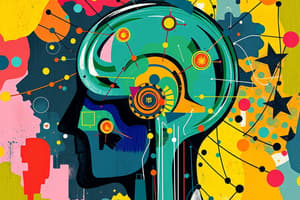Podcast
Questions and Answers
What is one of the key challenges in AI governance related to autonomous vehicles?
What is one of the key challenges in AI governance related to autonomous vehicles?
- Establishing vehicle manufacturing standards
- Determining legal liability for accidents (correct)
- Designing user-friendly interfaces
- Integration of AI with traditional vehicles
Which aspect does public policy play in the context of AI governance?
Which aspect does public policy play in the context of AI governance?
- Developing AI algorithms for national security
- Creating AI development protocols
- Formulating regulations to promote responsible AI use (correct)
- Establishing ethical guidelines for data usage
What challenge is faced in asserting intellectual property rights in AI development?
What challenge is faced in asserting intellectual property rights in AI development?
- Standardizing AI coding languages
- Understanding the technical requirements for patenting
- Managing international intellectual property treaties
- Defining authorship in AI-generated works (correct)
What is a significant enforcement challenge in AI governance?
What is a significant enforcement challenge in AI governance?
How does emerging legislation impact AI governance?
How does emerging legislation impact AI governance?
What is a primary concern regarding legal liability for AI systems?
What is a primary concern regarding legal liability for AI systems?
Which of the following is a challenge in international trade regarding AI governance?
Which of the following is a challenge in international trade regarding AI governance?
What legal challenge is commonly associated with AI-powered autonomous vehicles?
What legal challenge is commonly associated with AI-powered autonomous vehicles?
Which aspect is vital in the governance of AI related to intellectual property rights management?
Which aspect is vital in the governance of AI related to intellectual property rights management?
What factor significantly influences AI governance through emerging legislation?
What factor significantly influences AI governance through emerging legislation?
Flashcards
Public Policy in AI
Public Policy in AI
Framework for AI development, aligning technology with societal values and ethics.
AI System Liability
AI System Liability
Complex question of who is responsible: developers, users, or manufacturers.
AI and Intellectual Property
AI and Intellectual Property
Challenges in AI-generated works regarding authorship and copyright ownership complexities.
AI in International Trade
AI in International Trade
Signup and view all the flashcards
AI in National Security
AI in National Security
Signup and view all the flashcards
Enforcement Challenges in AI
Enforcement Challenges in AI
Signup and view all the flashcards
AI Autonomous Vehicles
AI Autonomous Vehicles
Signup and view all the flashcards
AI in IP Management
AI in IP Management
Signup and view all the flashcards
Emerging Legislation on AI
Emerging Legislation on AI
Signup and view all the flashcards
Case Law in AI
Case Law in AI
Signup and view all the flashcards
Study Notes
The Role of Public Policy in AI Governance
- Public policy shapes the framework for AI development, ensuring technology aligns with societal values and ethics.
- Governments formulate policies to address risks associated with AI, such as discrimination and privacy concerns.
Legal Liability for Harm Caused by AI Systems
- Determining liability for harm caused by AI systems remains complex; it involves assessing who is responsible: developers, users, or manufacturers.
- Current legal frameworks may be inadequate to address damage caused by autonomous systems, leading to a push for specific AI liability laws.
Intellectual Property Challenges in AI Development
- AI-generated works raise questions about authorship and copyright ownership; traditional definitions of creativity may not apply.
- Patent systems face challenges in recognizing AI inventions, complicating protection for innovations developed autonomously.
AI Governance and Compliance in International Trade
- Different countries have varying regulations on AI usage, leading to compliance challenges for businesses operating internationally.
- Policies regarding data privacy and AI ethics influence trade relationships and market access in the tech sector.
Legal Aspects of AI in National Security
- AI technologies play a significant role in national security, including surveillance and defense applications.
- Legal frameworks must address the ethical implications of using AI in military operations and intelligence gathering.
Enforcement Challenges in AI Governance and Compliance
- Effective enforcement of AI regulations is hampered by the rapid pace of technology development.
- Regulatory bodies often lack the expertise and resources to monitor AI compliance effectively.
Legal Challenges in AI-Powered Autonomous Vehicles
- Autonomous vehicles face unique legal issues regarding liability in accidents and failures.
- Existing traffic and safety regulations may not adequately address the complexities of AI-driven transportation systems.
The Role of AI in Intellectual Property Rights Management
- AI can optimize IP rights management by analyzing data and predicting enforcement needs, streamlining processes.
- However, reliance on AI for IP management raises concerns regarding transparency and accountability.
The Impact of Emerging Legislation on AI Governance
- New legislation often seeks to balance innovation with public safety and ethical standards in AI.
- Emerging laws may focus on transparency, bias reduction, and accountability within AI systems.
Case Law and Precedents in AI Governance and Compliance
- Court rulings serve as precedents on legal responsibilities related to AI, influencing future regulations and compliance strategies.
- Landmark cases highlight the need for clear definitions and frameworks as AI technology continues to evolve.
The Role of Public Policy in AI Governance
- Public policy shapes the framework for AI development, ensuring technology aligns with societal values and ethics.
- Governments formulate policies to address risks associated with AI, such as discrimination and privacy concerns.
Legal Liability for Harm Caused by AI Systems
- Determining liability for harm caused by AI systems remains complex; it involves assessing who is responsible: developers, users, or manufacturers.
- Current legal frameworks may be inadequate to address damage caused by autonomous systems, leading to a push for specific AI liability laws.
Intellectual Property Challenges in AI Development
- AI-generated works raise questions about authorship and copyright ownership; traditional definitions of creativity may not apply.
- Patent systems face challenges in recognizing AI inventions, complicating protection for innovations developed autonomously.
AI Governance and Compliance in International Trade
- Different countries have varying regulations on AI usage, leading to compliance challenges for businesses operating internationally.
- Policies regarding data privacy and AI ethics influence trade relationships and market access in the tech sector.
Legal Aspects of AI in National Security
- AI technologies play a significant role in national security, including surveillance and defense applications.
- Legal frameworks must address the ethical implications of using AI in military operations and intelligence gathering.
Enforcement Challenges in AI Governance and Compliance
- Effective enforcement of AI regulations is hampered by the rapid pace of technology development.
- Regulatory bodies often lack the expertise and resources to monitor AI compliance effectively.
Legal Challenges in AI-Powered Autonomous Vehicles
- Autonomous vehicles face unique legal issues regarding liability in accidents and failures.
- Existing traffic and safety regulations may not adequately address the complexities of AI-driven transportation systems.
The Role of AI in Intellectual Property Rights Management
- AI can optimize IP rights management by analyzing data and predicting enforcement needs, streamlining processes.
- However, reliance on AI for IP management raises concerns regarding transparency and accountability.
The Impact of Emerging Legislation on AI Governance
- New legislation often seeks to balance innovation with public safety and ethical standards in AI.
- Emerging laws may focus on transparency, bias reduction, and accountability within AI systems.
Case Law and Precedents in AI Governance and Compliance
- Court rulings serve as precedents on legal responsibilities related to AI, influencing future regulations and compliance strategies.
- Landmark cases highlight the need for clear definitions and frameworks as AI technology continues to evolve.
Studying That Suits You
Use AI to generate personalized quizzes and flashcards to suit your learning preferences.




